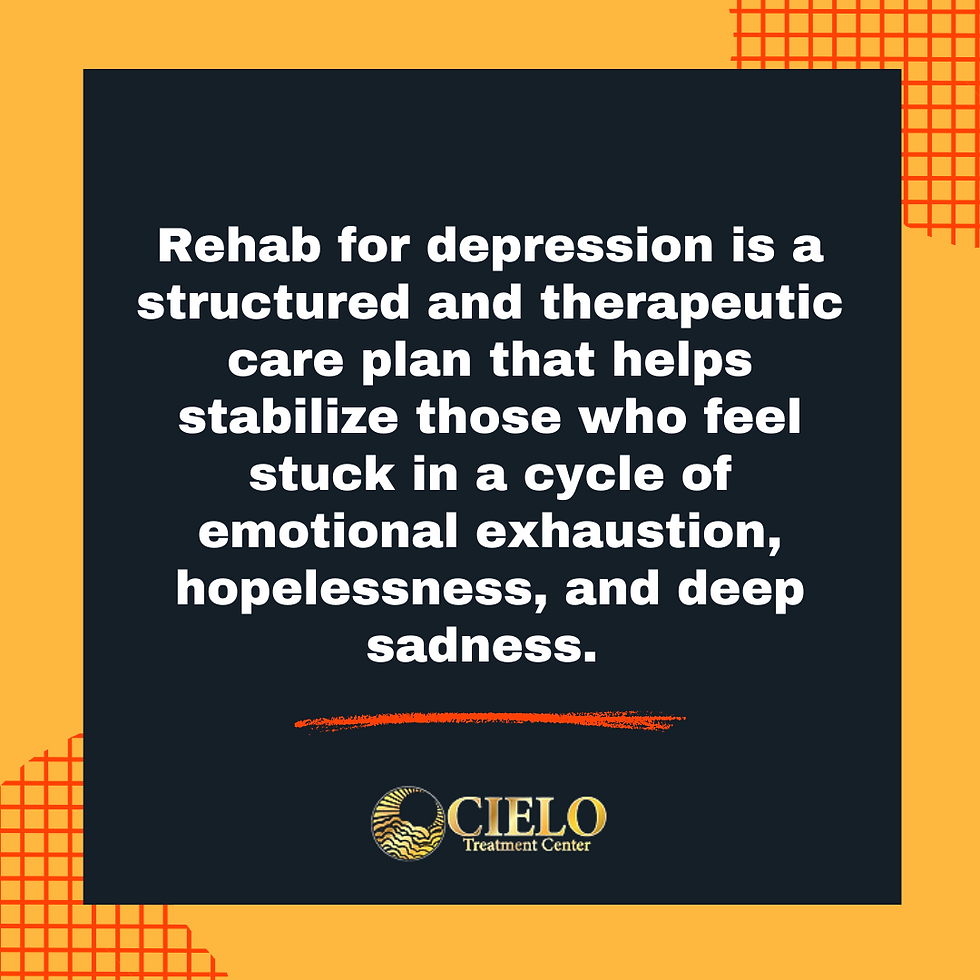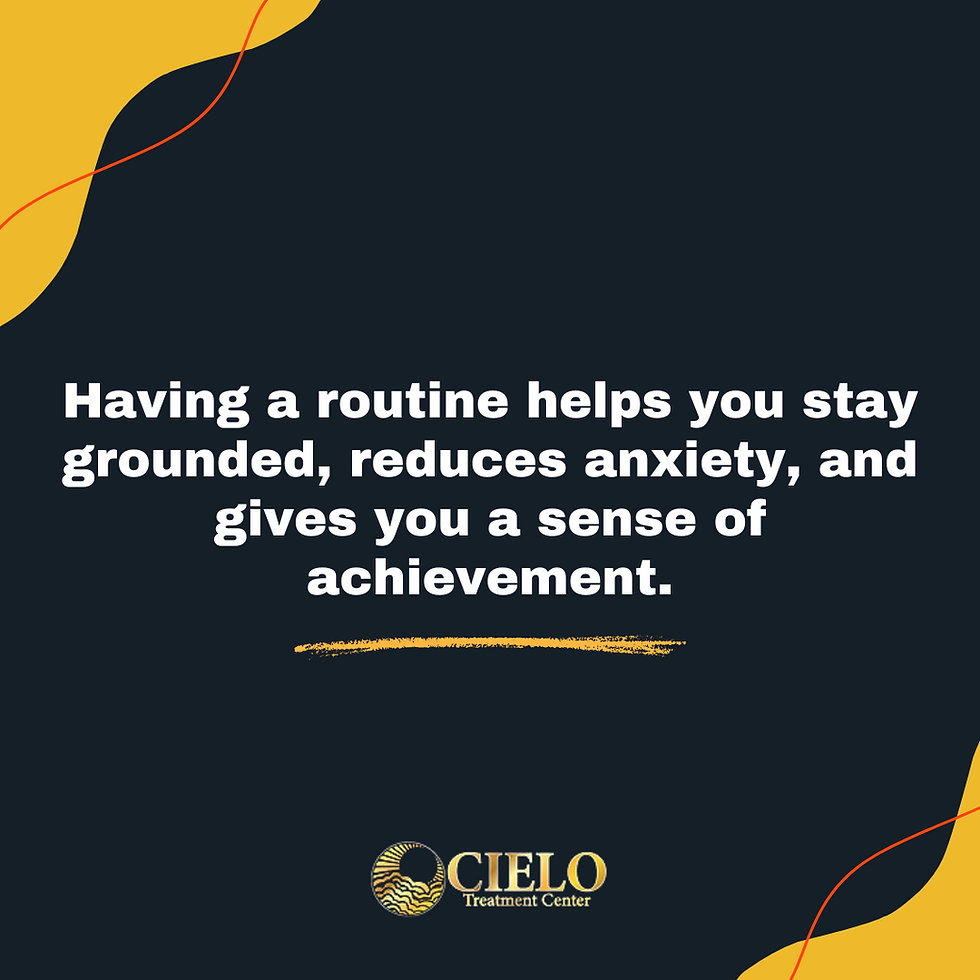Can You Go To Rehab For Depression?
- Rx Media
- May 22, 2025
- 5 min read
Updated: May 23, 2025
When you’re dealing with depression, even the smallest tasks can feel overwhelming. The idea of getting through the day—showering, answering emails, making meals—can seem impossible. In moments like these, many people wonder: Can you go to rehab for depression? The answer is yes and for some, it’s the kind of structured support that makes real recovery possible.
In this blog, let’s talk about what the treatment plan for depression looks like, and other mental health services that you may find useful.

What Does “Rehab For Depression” Mean?
Rehab for depression is a structured and therapeutic care plan that helps stabilize those who feel stuck in a cycle of emotional exhaustion, hopelessness, and deep sadness. Compared to typical weekly therapy sessions, rehab for depression offers an intensive approach that includes daily therapy, consistent emotional support, medication management, and holistic care.
Treatment plans for depression generally fall into two types: inpatient and outpatient. Outpatient treatment involves several therapy and treatment sessions during the week while allowing you to still attend to your daily responsibilities. This could be a good fit if your depression is currently manageable.
On the other hand, inpatient treatment provides you with a safe and structured environment where you have round-the-clock access to mental health professionals. Inpatient treatment is recommended if you’re constantly struggling to get out of bed and feel you can barely keep up with daily life.
When Does Someone Need Rehab
With all the stigma surrounding depression and addiction, it’s valid to question why and when you need to start reaching out for help. Fortunately, there are a few telltale signs to guide you toward that decision:
Unmanageable depression. Disruptive sleep, damaged relationships, and loss of interest are all signs of depression. If it’s been this way for weeks, it may be time to ask for help.
Self-harm and suicidal thoughts. If you’re having thoughts of harming yourself, it’s best not to wait.
Co-occurring issues. Depression may show up alongside substance abuse, anxiety, and trauma—handling all of these at the same time can be too much.

What A Treatment Plan For Depression Looks Like
So, what happens when you start rehab for depression? Here’s a list of things you can expect:
Treatment Team
First thing’s first, you can expect to meet your treatment team. You’re likely to have a therapist, medical doctor, and psychiatrist to help build a plan that fits your needs.
Therapy
All solid treatment plans involve therapy—individual therapy, or group therapy for peer support. You can expect cognitive behavioral therapy (CBT) to help you recognize and understand your negative thought patterns, before eventually replacing them with healthier ones. Trauma-informed therapies, such as accelerated resolution therapy (ART), may also be integrated into your treatment plan if your depression is tied to traumatic and stressful experiences.
Medication And Holistic Care
After consulting with your treatment team, you can also expect to be prescribed a few antidepressants. These will help balance your brain chemistry and alleviate your symptoms. Alongside medication, you will also build routines that have self-care and lifestyle support at their core. Regular sleep, exercise, and a healthy diet all play a huge role in young adult mental health, and the structure of rehab for depression will ensure that these make it to your treatment plan.
Goal-Setting
Finally, a good treatment plan for depression includes clear goals and progress check-ins. Your treatment team is aware that there’s no such thing as curing depression overnight. Instead, your team will work with you to craft timely and achievable goals and meet with you regularly so they can adjust these goals accordingly.
Benefits Of A Rehab Setting
Considering rehab for depression can be incredibly intimidating, and you’ll want to know if it’s worth all the effort to start. Here are a few good things that are waiting for you in rehab:
Immersive Environment
Rehab for depression gives you an immersive space to focus solely on your healing. So instead of juggling therapy with school, work, family drama, and the daily stressors of your life, the four walls of rehab give you the space to breathe. You’ll finally be working on recovery in a place designed to help you.
Separation From Stressors
One of the biggest perks of rehab for depression is the separation from toxic environments. You’ll have space between the unsupportive and judgmental people in your life, your stressful routines, and the surroundings that constantly weigh you down.
Peer Support And Professional Guidance
You also gain access to peer support and professional care. Apart from having your treatment team, you’ll be in a community that understands what you’re going through. This means being able to tell someone that you’re constantly tired, helpless, and disinterested in everything but also gain accountability partners and find value in helping others stick to their goals.
Structured Routines And Skill-Building
When your mental health is suffering, routines can be a lifesaver. Having a routine helps you stay grounded, reduces anxiety, and gives you a sense of achievement. During these routines, you’ll also learn how to manage stress, build healthy relationships, and deal with your emotions healthily.

Mental Health Program Options In Oregon
Treatment for depression can sometimes feel futile, but help is available and people care. Here are a few accessible mental health services led by professionals themselves:
Inpatient Treatment Programs
Portland, Oregon provides inpatient treatment programs that offer round-the-clock support. You’ll be residing in a safe and home-like environment with your treatment team, and a community that truly understands the struggle of dealing with depression. Your everyday life while at the facility will be planned and structured in alignment with your treatment plan, and professional staff will be around 24/7 if you need extra and personalized support.
Partial Hospitalization Programs (PHP)
If you feel safer at home during the night, partial hospitalization programs offer the same intensive support as inpatient programs but allow you to return home at the end of the day. A mental health program in Oregon will typically last about 4 to 5 hours a day, five days a week, and have the same structure and routine as more intensive programs.
Intensive Outpatient Programs
If you’d like more flexibility and balance, intensive outpatient programs may be a better fit. These programs offer therapy sessions a few times a week in shorter periods and provide comprehensive support while allowing you to maintain your daily responsibilities.

Conclusion
Depression is a serious and debilitating mental health concern that often makes you feel that healing must happen in isolation. From constantly feeling tired and helpless to complicated inner battles, depression is beyond challenging. But hearing that your struggles are heard and valid, and knowing that real and compassionate help exists can be life-changing.
Your depression may not be cured overnight, but you can navigate triggers, manage your emotions, and build routines that make life feel a little lighter. If you’re looking for a shoulder to lean on, contact us at Cielo Treatment Center and we’ll make the time.



Comments